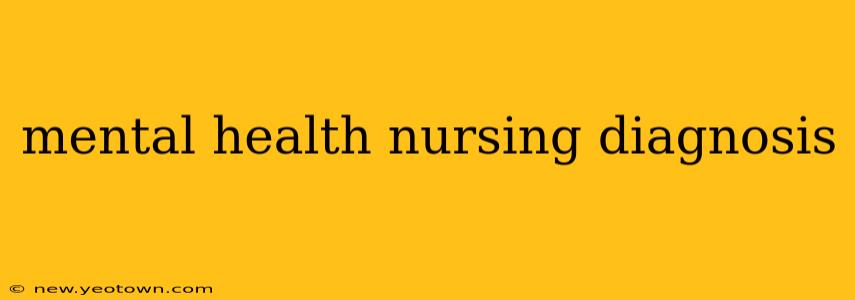The world of mental health nursing is a complex and deeply rewarding field. At its heart lies the ability to accurately assess a patient's condition and formulate a precise nursing diagnosis. This isn't just about ticking boxes; it's about understanding the individual's unique experience and tailoring care to meet their specific needs. This journey begins with a thorough assessment, leading to a nursing diagnosis that acts as a roadmap for effective intervention. Let's embark on this journey together.
What is a Mental Health Nursing Diagnosis?
A mental health nursing diagnosis isn't simply a label; it's a clinical judgment about a person's response to actual or potential mental health problems or life processes. It's a concise statement that identifies the patient's specific problem, its contributing factors, and the related defining characteristics. This diagnosis guides the development of a personalized care plan, outlining interventions to address the identified issues and improve the patient's well-being. Think of it as a crucial bridge between assessment and treatment.
Imagine Sarah, a young woman struggling with anxiety. A simple diagnosis of "Anxiety" isn't sufficient. A thorough assessment might reveal that her anxiety is related to recent job loss and family pressure, manifesting as insomnia, panic attacks, and social withdrawal. A more accurate nursing diagnosis would reflect these specifics, guiding interventions beyond just addressing the anxiety itself but also addressing the underlying stressors.
Common Mental Health Nursing Diagnoses
Several diagnoses frequently appear in mental health care. These are not exhaustive, but they represent commonly encountered challenges:
-
Risk for Self-Harm: This diagnosis applies when a patient exhibits behaviors or expresses thoughts suggesting a potential for self-injury or suicide. It requires careful monitoring and intervention to prevent harm.
-
Impaired Social Interaction: This diagnosis indicates difficulties in forming or maintaining relationships, often stemming from social anxiety, communication deficits, or negative past experiences. Interventions might include social skills training and support groups.
-
Disturbed Thought Processes: This diagnosis involves alterations in thinking patterns, such as delusions, hallucinations, or disorganized thinking. It's common in conditions like schizophrenia and requires specialized therapeutic interventions.
-
Ineffective Coping: This diagnosis addresses a patient's inability to manage stress effectively, leading to maladaptive behaviors or emotional distress. Interventions may focus on teaching coping mechanisms, stress reduction techniques, and problem-solving skills.
-
Anxiety: This is a broad diagnosis encompassing a range of anxiety disorders, characterized by excessive worry, fear, and physical symptoms. Interventions might include medication, therapy, and relaxation techniques.
-
Depression: Characterized by persistent sadness, loss of interest, and other symptoms, this diagnosis requires careful assessment to determine the severity and underlying causes. Treatment often involves medication, therapy, and lifestyle changes.
-
Ineffective Individual Coping: Similar to ineffective coping, but emphasizes the person's inability to effectively manage their own challenges and maintain emotional stability. This might manifest as substance abuse, withdrawal, or other self-destructive behaviors.
-
Hopelessness: This diagnosis indicates a feeling of despair and a loss of belief in the future. It's crucial to address this feeling through supportive interventions and hope-building strategies.
How are Mental Health Nursing Diagnoses Developed?
The process begins with a comprehensive assessment, which includes:
- Gathering information: This involves interviewing the patient, reviewing medical records, and consulting with other healthcare professionals.
- Observing behaviors: Nonverbal cues, interactions, and daily routines provide valuable insights.
- Identifying patterns: Recognizing recurring themes and behaviors helps to form a holistic understanding.
- Analyzing data: The collected information is meticulously analyzed to identify patterns and contributing factors.
- Formulating the diagnosis: Based on this analysis, a nursing diagnosis is created using standardized terminology, such as the NANDA-I (North American Nursing Diagnosis Association International) framework.
What are the Key Components of a Mental Health Nursing Diagnosis?
A well-written nursing diagnosis typically includes three parts:
- Problem statement: This describes the patient's response to a health problem (e.g., Risk for Self-Harm).
- Related to (etiology): This identifies the factors contributing to the problem (e.g., related to feelings of hopelessness and recent loss).
- As evidenced by (defining characteristics): This lists the specific observable symptoms or behaviors supporting the diagnosis (e.g., as evidenced by verbalizations of suicidal ideation, self-mutilation, and withdrawal).
Frequently Asked Questions
How do mental health nursing diagnoses differ from medical diagnoses?
Medical diagnoses focus on the disease or condition itself (e.g., schizophrenia, bipolar disorder), while nursing diagnoses focus on the patient's response to that condition or other health problems (e.g., impaired social interaction related to delusions and paranoia).
Who develops the mental health nursing diagnosis?
Registered Nurses (RNs) with specialized training in mental health are responsible for developing and documenting nursing diagnoses. Collaboration with other members of the healthcare team is crucial.
How often are mental health nursing diagnoses reviewed and updated?
Nursing diagnoses should be reviewed and updated regularly (at least daily or as the patient's condition changes) to ensure the care plan remains relevant and effective. They are dynamic and adjust to the patient's evolving needs.
Are there different frameworks for mental health nursing diagnoses?
While NANDA-I provides a widely used framework, other models and approaches exist, tailoring diagnoses to specific needs and contexts.
Mental health nursing diagnoses are a cornerstone of effective patient care. By accurately assessing and diagnosing, nurses play a vital role in helping individuals navigate mental health challenges and achieve improved well-being. The process is not a simplistic labeling but a deep dive into understanding an individual's struggles, experiences, and journey toward recovery.

